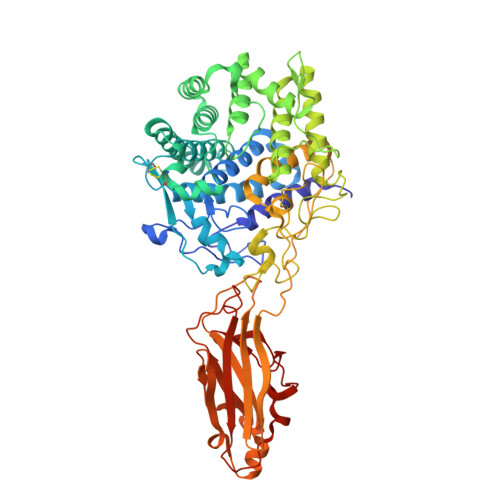Molecular mechanism of cellulose depolymerization by the two-domain BlCel9A enzyme from the glycoside hydrolase family 9.
de Araujo, E.A., Cortez, A.A., Pellegrini, V.O.A., Vacilotto, M.M., Cruz, A.F., Batista, P.R., Polikarpov, I.(2024) Carbohydr Polym 329: 121739-121739
- PubMed: 38286536
- DOI: https://doi.org/10.1016/j.carbpol.2023.121739
- Primary Citation of Related Structures:
8U49, 8U4A, 8U4F - PubMed Abstract:
Carbohydrate-active enzymes from the glycoside hydrolase family 9 (GH9) play a key role in processing lignocellulosic biomass. Although the structural features of some GH9 enzymes are known, the molecular mechanisms that drive their interactions with cellulosic substrates remain unclear. To investigate the molecular mechanisms that the two-domain Bacillus licheniformis BlCel9A enzyme utilizes to depolymerize cellulosic substrates, we used a combination of biochemical assays, X-ray crystallography, small-angle X-ray scattering, and molecular dynamics simulations. The results reveal that BlCel9A breaks down cellulosic substrates, releasing cellobiose and glucose as the major products, but is highly inefficient in cleaving oligosaccharides shorter than cellotetraose. In addition, fungal lytic polysaccharide oxygenase (LPMO) TtLPMO9H enhances depolymerization of crystalline cellulose by BlCel9A, while exhibiting minimal impact on amorphous cellulose. The crystal structures of BlCel9A in both apo form and bound to cellotriose and cellohexaose were elucidated, unveiling the interactions of BlCel9A with the ligands and their contribution to substrate binding and products release. MD simulation analysis reveals that BlCel9A exhibits higher interdomain flexibility under acidic conditions, and SAXS experiments indicate that the enzyme flexibility is induced by pH and/or temperature. Our findings provide new insights into BlCel9A substrate specificity and binding, and synergy with the LPMOs.
- Brazilian Synchrotron Light Laboratory, Brazilian Center for Research in Energy and Materials, Giuseppe Maximo Scolfaro, 10000, Campinas, SP 13083-970, Brazil; Sao Carlos Institute of Physics, University of Sao Paulo, Av. Trabalhador Sao Carlense, 400, Sao Carlos, SP 13566-590, Brazil.
Organizational Affiliation:





















